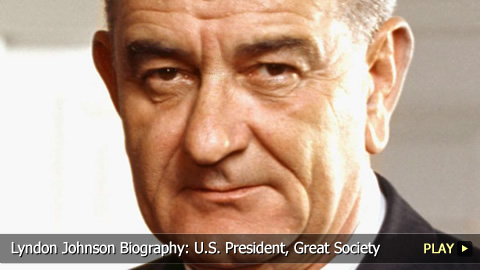Lyndon Johnson Biography: U.S. President, Great Society

Growing Up
Lyndon Baines Johnson was born August 27th, 1908 in Stonewall, Texas. The oldest of five siblings, he became interested in politics while at the Southwest Texas State Teachers’ College. There, he also developed his persuasion skills during campus debates and forged a relationship with the Mexican-American community by teaching impoverished students.
Interest in Politics
Following his 1930 graduation, his father’s connections helped LBJ become Democratic Congressman Richard M. Kleberg’s legislative secretary, where he built relationships with lawmakers and politicians, like President Franklin Delano Roosevelt.
Marriage
Over the next years, Johnson attended Georgetown University Law Center and married Claudia Alta Taylor, with whom he had two daughters. In 1937, Lady Bird Johnson, as she was known, provided financial and political support during her husband’s successful campaign for Congress.
Congress and World War II
Johnson dedicated his time in the House to improving his district, though he spent a few months as a navy lieutenant commander during World War II following the Japanese attack on Pearl Harbor.
Texas Senate
In 1948, Johnson won a spot in the Texas state Senate after a contentious campaign, and advanced rapidly to become House minority leader in 1953. Johnson was so skilled at pushing his agenda and gathering information on his fellow Senators that his methods were dubbed “The Treatment.”
Heart Attack
In 1955, Johnson’s 60-cigarette-per-day habit caught up with him when he almost died from a massive heart attack, causing him to quit smoking.
John F. Kennedy
LBJ continued following his political ambitions in 1960 by canvassing for the Democratic Presidential candidacy. Though he lost to John F. Kennedy, he did become his running mate. Later that year, Johnson helped win over the South when the JFK/LBJ ticket defeated Dwight Eisenhower in the election.
Vice Presidency
Johnson felt underused as Vice President, and disliked Kennedy’s entourage. Rumors circulated that JFK planned to drop LBJ from the 1964 ticket; but things changed on November 22nd, 1963. Following Kennedy’s assassination in Dallas, Johnson was sworn in as the 36th President of the United States aboard Air Force One.
Presidency
During his first year, Johnson established the Warren Commission to examine JFK’s murder, and honored him by pushing through 1964’s Civil Rights Act. This was one of the first major achievements of Johnson’s “Great Society” agenda, which was designed to combat poverty, racial discrimination, and more.
Great Society
On November 3rd, 1964, LBJ and running mate Hubert Humphrey won the election by a landslide against Republican Barry Goldwater. Johnson’s “Great Society” programs continued with 1965’s Voting Rights Act; however, he focused much of his mandate on solving poverty through education, by giving public education access to federal funding, for example.
Health, Immigration and the Arts
He also increased health benefits through Medicare and Medicaid, expanded American immigration policies, and tackled culture, the environment, and the media, which eventually led to the establishment of public broadcasting.
Race Riots
However, when poor neighborhoods saw little improvement, African-American communities began rioting violently. Growing media criticism of the country’s military participation in the Vietnam War exacerbated those problems.
Vietnam War
Following 1964’s notorious Gulf of Tonkin Resolution, LBJ began sending American forces to Vietnam without Senate approval to stop the spread of communism. While publicly Johnson’s administration claimed impending victory, the U.S. was shocked by 1968’s surprise Tet Offensive attacks by the Communists. LBJ’s credibility and popularity plummeted further as spending, protests and deaths increased.
Democratic Party
The final straw for Johnson was the subsequent rift within the Democratic Party: he decided not to run for the presidency in 1968, and eventually ended all bombing of North Vietnam to set peace talks in motion.
Political Assassinations
The country was shattered further by the assassinations of Martin Luther King, Jr. and Robert F. Kennedy in 1968. In a political realignment, the public chose Republican Richard Nixon as president later that year.
Retirement
After leaving office, Johnson retired to his Texas ranch and worked on his memoirs. He also resumed his smoking habit, which caused his health to deteriorate further until he died on January 22nd, 1973 following his third heart attack.
Legacy
While he was criticized for the Vietnam War, his use of wiretapping, and his ruthless Johnson Treatment, Lyndon Johnson is remembered positively for his domestic policies and as a hero in the fight for civil rights.
